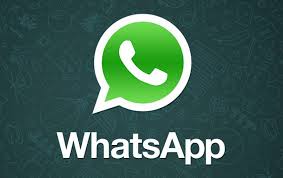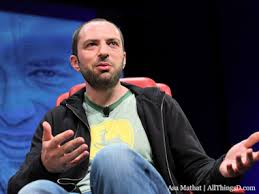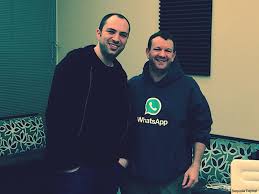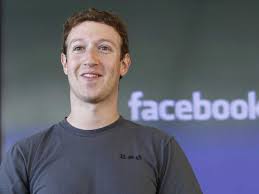When Google bought YouTube in 2006 for $1.65 billion in stock it seemed expensive given the lack of meaningful revenues, but the the Microsoft deal for Skype in April 2011 for $8.5 billion raised the bar for tech acquisitions. When Facebook bought Instagram in April 2012 for $1 billion in cash and shares many critisicsed the company for the high price but this was blown out of the water this week when the social network spent up to $19 billion on WhatsApp, the web chat app for smartphones. WhatsApp permits users to send texts, photos and videos on their smartphones. It is very popular with approximately 450 million monthly users, 70% of whom use it on a daily basis.

The deal is the most expensive acquisition of a private venture capital-backed company yet. Facebook is buying WhatsApp for $12 billion in stock and $4 billion in cash with another $3 billion in restricted stock units to be granted to WhatsApp’s founders and employees that will vest over the next four years. The deal took over 2 years for Facebook to consummate after overtures from Google were rebutted over a dinner on February 9th with Mark Zuckerburg and WhatsApp CEO Jan Koum. The transaction equates to about 11% of Facebook’s market value.

For Facebook the company is now building an ecosystem which includes photo-sharing app Instagram and WhatsApp that could help it dominate mobile which likes Google products like Maps, Earth and News draw in users, build engagement and generate lots and lots of data. The Instagram and WhatsApp deal make it increasingly likely that Facebook will not suffer the same fate as companies like MySpace which became irrelevant as their initial “cool” wore off.
Facebook said of the buy, “The acquisition supports Facebook and WhatsApp’s shared mission to bring more connectivity and utility to the world by delivering core internet services efficiently and affordably. The combination will help accelerate growth and user engagement across both companies.
WhatsApp describes itself “a personal real-time messaging network allowing millions of people around the world to stay connected with their friends and family.” The app is free to install, and then users pay $.99 every year or 69p after paying nothing for the first 12 months of use. In essence it’s a free text messaging replacement which is bad news for mobile phone network operators. Unusually the company does not use advertising and relies instead on the 99 cent fee for all its revenues.
According to the Whatsapp web site “WhatsApp Messenger is a cross-platform mobile messaging app which allows you to exchange messages without having to pay for SMS. WhatsApp Messenger is available for iPhone, BlackBerry, Android, Windows Phone and Nokia and yes, those phones can all message each other! Because WhatsApp Messenger uses the same internet data plan that you use for email and web browsing, there is no cost to message and stay in touch with your friends.”
The company says it has more than 450 million monthly active users worldwide and over 320 million daily active users. The number of daily active users of WhatsApp has climbed to 72%, in contrast the industry standard is between 10% and 20. Users send as many messages as text messages sent in the world. The service is very popular and adding a a million new users a day.
On February 19th Jan Koum, WhatsApp’s co-founder and CEO, posted a blog on the company’s website saying:
“Almost five years ago we started WhatsApp with a simple mission: building a cool product used globally by everybody. Nothing else mattered to us.
Today we are announcing a partnership with Facebook that will allow us to continue on that simple mission. Doing this will give WhatsApp the flexibility to grow and expand, while giving me, Brian, and the rest of our team more time to focus on building a communications service that’s as fast, affordable and personal as possible.
Here’s what will change for you, our users: nothing.
WhatsApp will remain autonomous and operate independently. You can continue to enjoy the service for a nominal fee. You can continue to use WhatsApp no matter where in the world you are, or what smartphone you’re using. And you can still count on absolutely no ads interrupting your communication. There would have been no partnership between our two companies if we had to compromise on the core principles that will always define our company, our vision and our product.
On a personal note, Brian and I couldn’t be more proud to be part of a small team of people who, in just under five years, built a communication service that now supports over 450 million monthly active users worldwide and over 320 million daily active users. They have helped re-define and revolutionize communication for the 21st century, and we couldn’t be more grateful.
Our team has always believed that neither cost and distance should ever prevent people from connecting with their friends and loved ones, and won’t rest until everyone, everywhere is empowered with that opportunity. We want to thank all of our users and everybody in our lives for making this next chapter possible, and for joining us as we continue on this very special journey. “

WhatsApp was notable in the fact that its ex-Yahoo founders kept the operation mean and lean, with funding of about $60 million ($8 million from Sequoia) with most of its 50 engineers based in Russia where there is plenty of cheap but experienced tech talent. Jan Koum founded WhatsApp with Brian Acton in 2010. After the deal closes, Koum is going to join Facebook as an executive and become a member of Facebook’s board of directors.
Sequoia Capital said of the deal:
“Earlier today, Facebook announced its acquisition of WhatsApp for $16 billion. It’s a spectacular milestone for the company’s co-founders Jan Koum and Brian Acton, and their remarkable team.
From the moment they opened the doors of WhatsApp, Jan and Brian wanted a different kind of company. While others sought attention, Jan and Brian shunned the spotlight, refusing even to hang a sign outside the WhatsApp offices in Mountain View. As competitors promoted games and rushed to build platforms, Jan and Brian remained devoted to a clean, lightning fast communications service that works flawlessly.
This approach has served WhatsApp well and its users better. WhatsApp has done for messaging what Skype did for voice and video calls. By using the Internet as its communications backbone, WhatsApp has completely transformed personal communications, which was previously dominated by the world’s largest wireless carriers.
For the past three years, it’s been our privilege to work shoulder-to-shoulder with Jan and Brian as their close business partner and investor. It’s been a remarkable journey, and we could not be happier for these talented underdogs whose unshakeable beliefs and maverick natures epitomize the spirit of Silicon Valley.
Those less familiar with WhatsApp and its wonderful product will marvel at how a young company could be so valuable. Many of those people will be in the U.S. because there’s no other home grown technology company that’s so widely loved overseas and so under appreciated at home. WhatsApp reminds us of other companies that we partnered with — like PayPal, and YouTube — whose founders chose a similar path to Jan and Brian. Today PayPal and YouTube are both household names around the world. Tomorrow the same will hold true for WhatsApp.”
Facebook’s shares initially fell around 5% on the news because of the sheer size of the acquisition compared with previous deals over the years, but they recovered their poise to close at $69.63, close to an all time high.
Facebook stresses that WhatsApp will be run independently and would be pushing for user, not revenue, growth in the near term. The founders have been anti-advertising after experiences at Yahoo and Mark Zuckerberg said on Wednesday he did not think adverts were necessarily the best way to generate revenue from messaging. But the question remains, how will Facebook monetize this acquisition? The same question was asked of Google when it bought YouTube in 2006 but in subsequent years features like pre-roll ads were introduced, a similar approach will be tricky on WhatsApp. Maybe the $0.99 fee will rise over time? Certainly the huge amount of data that users generate could be used to more effectively target advertising in other areas of the Facebook experience.
In the event of termination of the Merger Agreement under certain circumstances principally related to a failure to obtain required regulatory approvals, the Merger Agreement provides for Facebook to pay WhatsApp a fee of $1 billion in cash and to issue to WhatsApp a number of shares of Facebook’s Class A common stock equal to $1 billion based on the average closing price of the ten trading days preceding such termination date.

WhatsApp has made communication easy, reliable, fast, secure and incredibly cheap. The company’s ethos has been all about giving users real time communication without interference – hence no ads. It does not collect personal information like your name or age and registration is authenticated using a phone number. Once delivered, messages are deleted from WhatsApp’s servers. Users will be hoping that Facebook won’t mess things up at WhatsApp and for now Zuckerberg is likely to tread carefully. The price might be eye watering, but time will tell.
Contrarian Investor UK
IMPORTANT: The posts I make are in no way meant as investment suggestions or recommendations to any visitors to the site. They are simply my views, personal reflections and analysis on the markets. Anyone who wishes to spread bet or buy stocks should rely on their own due diligence and common sense before placing any spread trade.
by contrarianuk
Facebook continues to build its mobile ecosystem with WhatsApp deal for $19 billion
Feb 21, 2014 at 7:53 am in Market Commentary by contrarianuk
When Google bought YouTube in 2006 for $1.65 billion in stock it seemed expensive given the lack of meaningful revenues, but the the Microsoft deal for Skype in April 2011 for $8.5 billion raised the bar for tech acquisitions. When Facebook bought Instagram in April 2012 for $1 billion in cash and shares many critisicsed the company for the high price but this was blown out of the water this week when the social network spent up to $19 billion on WhatsApp, the web chat app for smartphones. WhatsApp permits users to send texts, photos and videos on their smartphones. It is very popular with approximately 450 million monthly users, 70% of whom use it on a daily basis.
The deal is the most expensive acquisition of a private venture capital-backed company yet. Facebook is buying WhatsApp for $12 billion in stock and $4 billion in cash with another $3 billion in restricted stock units to be granted to WhatsApp’s founders and employees that will vest over the next four years. The deal took over 2 years for Facebook to consummate after overtures from Google were rebutted over a dinner on February 9th with Mark Zuckerburg and WhatsApp CEO Jan Koum. The transaction equates to about 11% of Facebook’s market value.
For Facebook the company is now building an ecosystem which includes photo-sharing app Instagram and WhatsApp that could help it dominate mobile which likes Google products like Maps, Earth and News draw in users, build engagement and generate lots and lots of data. The Instagram and WhatsApp deal make it increasingly likely that Facebook will not suffer the same fate as companies like MySpace which became irrelevant as their initial “cool” wore off.
Facebook said of the buy, “The acquisition supports Facebook and WhatsApp’s shared mission to bring more connectivity and utility to the world by delivering core internet services efficiently and affordably. The combination will help accelerate growth and user engagement across both companies.
WhatsApp describes itself “a personal real-time messaging network allowing millions of people around the world to stay connected with their friends and family.” The app is free to install, and then users pay $.99 every year or 69p after paying nothing for the first 12 months of use. In essence it’s a free text messaging replacement which is bad news for mobile phone network operators. Unusually the company does not use advertising and relies instead on the 99 cent fee for all its revenues.
According to the Whatsapp web site “WhatsApp Messenger is a cross-platform mobile messaging app which allows you to exchange messages without having to pay for SMS. WhatsApp Messenger is available for iPhone, BlackBerry, Android, Windows Phone and Nokia and yes, those phones can all message each other! Because WhatsApp Messenger uses the same internet data plan that you use for email and web browsing, there is no cost to message and stay in touch with your friends.”
The company says it has more than 450 million monthly active users worldwide and over 320 million daily active users. The number of daily active users of WhatsApp has climbed to 72%, in contrast the industry standard is between 10% and 20. Users send as many messages as text messages sent in the world. The service is very popular and adding a a million new users a day.
On February 19th Jan Koum, WhatsApp’s co-founder and CEO, posted a blog on the company’s website saying:
“Almost five years ago we started WhatsApp with a simple mission: building a cool product used globally by everybody. Nothing else mattered to us.
Today we are announcing a partnership with Facebook that will allow us to continue on that simple mission. Doing this will give WhatsApp the flexibility to grow and expand, while giving me, Brian, and the rest of our team more time to focus on building a communications service that’s as fast, affordable and personal as possible.
Here’s what will change for you, our users: nothing.
WhatsApp will remain autonomous and operate independently. You can continue to enjoy the service for a nominal fee. You can continue to use WhatsApp no matter where in the world you are, or what smartphone you’re using. And you can still count on absolutely no ads interrupting your communication. There would have been no partnership between our two companies if we had to compromise on the core principles that will always define our company, our vision and our product.
On a personal note, Brian and I couldn’t be more proud to be part of a small team of people who, in just under five years, built a communication service that now supports over 450 million monthly active users worldwide and over 320 million daily active users. They have helped re-define and revolutionize communication for the 21st century, and we couldn’t be more grateful.
Our team has always believed that neither cost and distance should ever prevent people from connecting with their friends and loved ones, and won’t rest until everyone, everywhere is empowered with that opportunity. We want to thank all of our users and everybody in our lives for making this next chapter possible, and for joining us as we continue on this very special journey. “
WhatsApp was notable in the fact that its ex-Yahoo founders kept the operation mean and lean, with funding of about $60 million ($8 million from Sequoia) with most of its 50 engineers based in Russia where there is plenty of cheap but experienced tech talent. Jan Koum founded WhatsApp with Brian Acton in 2010. After the deal closes, Koum is going to join Facebook as an executive and become a member of Facebook’s board of directors.
Sequoia Capital said of the deal:
“Earlier today, Facebook announced its acquisition of WhatsApp for $16 billion. It’s a spectacular milestone for the company’s co-founders Jan Koum and Brian Acton, and their remarkable team.
From the moment they opened the doors of WhatsApp, Jan and Brian wanted a different kind of company. While others sought attention, Jan and Brian shunned the spotlight, refusing even to hang a sign outside the WhatsApp offices in Mountain View. As competitors promoted games and rushed to build platforms, Jan and Brian remained devoted to a clean, lightning fast communications service that works flawlessly.
This approach has served WhatsApp well and its users better. WhatsApp has done for messaging what Skype did for voice and video calls. By using the Internet as its communications backbone, WhatsApp has completely transformed personal communications, which was previously dominated by the world’s largest wireless carriers.
For the past three years, it’s been our privilege to work shoulder-to-shoulder with Jan and Brian as their close business partner and investor. It’s been a remarkable journey, and we could not be happier for these talented underdogs whose unshakeable beliefs and maverick natures epitomize the spirit of Silicon Valley.
Those less familiar with WhatsApp and its wonderful product will marvel at how a young company could be so valuable. Many of those people will be in the U.S. because there’s no other home grown technology company that’s so widely loved overseas and so under appreciated at home. WhatsApp reminds us of other companies that we partnered with — like PayPal, and YouTube — whose founders chose a similar path to Jan and Brian. Today PayPal and YouTube are both household names around the world. Tomorrow the same will hold true for WhatsApp.”
Facebook’s shares initially fell around 5% on the news because of the sheer size of the acquisition compared with previous deals over the years, but they recovered their poise to close at $69.63, close to an all time high.
Facebook stresses that WhatsApp will be run independently and would be pushing for user, not revenue, growth in the near term. The founders have been anti-advertising after experiences at Yahoo and Mark Zuckerberg said on Wednesday he did not think adverts were necessarily the best way to generate revenue from messaging. But the question remains, how will Facebook monetize this acquisition? The same question was asked of Google when it bought YouTube in 2006 but in subsequent years features like pre-roll ads were introduced, a similar approach will be tricky on WhatsApp. Maybe the $0.99 fee will rise over time? Certainly the huge amount of data that users generate could be used to more effectively target advertising in other areas of the Facebook experience.
In the event of termination of the Merger Agreement under certain circumstances principally related to a failure to obtain required regulatory approvals, the Merger Agreement provides for Facebook to pay WhatsApp a fee of $1 billion in cash and to issue to WhatsApp a number of shares of Facebook’s Class A common stock equal to $1 billion based on the average closing price of the ten trading days preceding such termination date.
WhatsApp has made communication easy, reliable, fast, secure and incredibly cheap. The company’s ethos has been all about giving users real time communication without interference – hence no ads. It does not collect personal information like your name or age and registration is authenticated using a phone number. Once delivered, messages are deleted from WhatsApp’s servers. Users will be hoping that Facebook won’t mess things up at WhatsApp and for now Zuckerberg is likely to tread carefully. The price might be eye watering, but time will tell.
Contrarian Investor UK
IMPORTANT: The posts I make are in no way meant as investment suggestions or recommendations to any visitors to the site. They are simply my views, personal reflections and analysis on the markets. Anyone who wishes to spread bet or buy stocks should rely on their own due diligence and common sense before placing any spread trade.